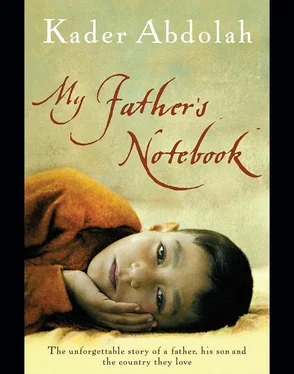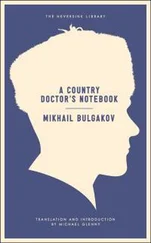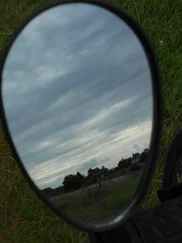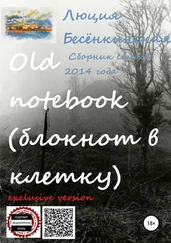Then he turned back to me. “Ask him if he’s arranged for a house to live in.”
“Not a house, but a room,” my father replied.
“Ask him what he plans to do in the city. Tell him that everything’s different there, that nobody knows Akbar, that he’s not automatically welcome everywhere. Here in the mountains he’s Aga Akbar the magician, but there in the city he’s a nobody, a deaf-and-dumb carpet-weaver. He needs to know that. Make sure he understands!”
I told him. I made sure he understood.
“We’ll see,” my father said.
“OK. I have nothing more to say to him. Have a safe trip. You can tell him that from me,” Kazem Khan said, and he stood up. “Forget the tea, Tina. I’m going.”
He went into the courtyard. “Ishmael!” he called. “Would you come here for a moment?”
I followed him as he walked past the cedar trees. He didn’t look at me as he talked. I’ve forgotten his exact words, though I have a vivid memory of the scene: I was walking behind Kazem Khan, not looking at his face but at his hands, clasped behind his back. In his hands he held a riding crop. The sun shone down through the trees and struck his shoulders. He walked, I followed. He talked, I listened. At some point, he turned, held out his hand and said, “Have a safe trip, my boy.”
Then the scene suddenly shifted again: the covered wagon creaked down the road. I was sitting beside my father. A stricken Tina sat in the back and stared vacantly into space with my youngest sister on her lap. My other two sisters were delighted at the unexpected journey. They giggled as the wagon bounced and swayed down the treacherous mountain road.
I was worried about Tina, afraid she’d go into hysterics again. Despite my age, I was now the man of the house. That’s what Kazem Khan had wanted to tell me before we left. My job, he said, would be to look after Tina and the girls.
This was the first time my father had assumed responsibility for his family and we were now on our own. I could feel the weight of this enormous responsibility on my shoulders, too. My throat was so tight I could barely swallow. I was scared, but I was also determined not to let anyone see the fear in my eyes.
After about three hours, we had left behind the mountains, the mountain goats, the foxes and the wild red tulips, and descended into a plain. We travelled the same roads as the cars and buses.
We hadn’t eaten breakfast and apparently we weren’t going to get any lunch, either.
“Stop,” I signed. “We’ve got to eat.”
In all those hours I hadn’t said a word to my father, or even looked at him. Was I angry? I don’t remember. No, probably not, because I didn’t think of myself as a separate individual. How can I explain it? I was him, or he was me; in any case, we were one. I couldn’t be angry with him. And even if I were, my anger would have been directed not so much at him as at myself, because I — or, rather, my father and I — had embarked on the same great adventure. We didn’t know if we could survive in the city, but we wanted to try. The city called to us and we couldn’t refuse.
He stopped the wagon and we got out to rest.
“Don’t look so gloomy,” I signed. “Talk to Tina, so she doesn’t start acting crazy again.”
Only then did he seem to realise what was going on. He took some bread and cheese out of a cotton bag and gave it to Tina. Then he patted my sister, the one sitting on Tina’s lap. I saw his hand graze Tina’s breast.
We rode on. After an hour we came to the outskirts of the city. To my surprise, there were no cars and no schools. Off in the distance we saw three tall blocks of flats. My father headed the horse in that direction and soon we pulled up in front of the ugliest one. Apparently our rented room wasn’t in the city itself, but in an outlying industrial area.
We were excited anyway, because we’d never seen a building that was four storeys high.
We carried our things up to a flat on the top floor: one large room plus a dark storeroom. If you looked out of the window you could see the mountains, including the peak of Saffron Mountain, which rose up above the entire range. The city was off to the right, though you couldn’t see it from our apartment.
Tina unrolled the carpets and put the kitchen things in the storeroom. She started to make soup, the traditional meal of Saffron Village, and as she cooked, she pondered her new situation.
“We’ll see,” she said and placed a bowl of soup before me. She hadn’t said a word all day.
And with those two short words, our life in the city began.
Early in the morning, my father went off to work. A carpet-weaver he met in the bazaar had promised him a job.
“What kind of a job?” I asked. (Tina was actually the one who wanted to know.)
“I’m not sure. It’s in a big building. The boss is rich. He’s the one who lent me the covered wagon. I’m not sure … I think I’ll be sewing numbers on carpets.”
“Sewing numbers,” Tina sighed.
“Why sewing numbers?” I gestured.
“I don’t know. A lot of people in the shop sew numbers on carpets. Then they load the carpets into a truck and take them to the train. And the train brings them to … I don’t know … far, far away.”
“May Allah protect us,” Tina said. “Aga Akbar, the magician, has become a seamstress!” She went into the storeroom and locked the door.
A week later I started school. The arrangements had been made by one of the men my father worked with. The school was on the other side of town, about three or four miles away. Because no buses went that way, I had to walk, like all the other children.
As soon as school was finished, I went straight home. I was worried about Tina. Kazem Khan had told me to keep an eye on her, because there was a wild animal inside her — a wolf.
One afternoon I came home to find my sisters playing quietly. Tina was nowhere to be seen. I don’t know why, but suddenly I sensed the presence of the wolf.
“Where’s Tina?” I asked.
They didn’t know. I opened the door to the storeroom and peered into the darkness. There was no sign of Tina. I ran over to the neighbours.
“Hello, is Tina here?”
No, she wasn’t. So far, she’d had little contact with the neighbours. I raced home and went back to the storeroom. I stood in the dark for a while, but I still couldn’t see her. Then I listened intently and heard a sound. It was Tina. Or not really Tina. The gleaming eyes of the wolf stared back at me from the darkest corner of the storeroom. God help me, I didn’t know what to do. If we’d been in the village, I would have jumped on the horse, ridden straight to Kazem Khan’s and cried, “Come quick! The wolf is back!”
But we weren’t in the village and Kazem Khan wasn’t here.
So I took a step backwards, as I had seen Kazem Khan do, and called softly to my sister, “Go and get the Holy Book!” She snatched the book off the mantel and handed it to me.
I knelt by the storeroom door, turned to the wild beast, kissed the cover, closed my eyes, opened the book to a page and began to chant:
Wa az-zoha, wa az-zoha.
Wa al-layl eza saja.
Wa al-layl: ma waddaka, waddaka,
ma waddaka rabboka, rabboka
Wa az-zoha wa al-layl,
Wa al-akhiratu khayrun lakka
Rabboka Allah, rabboka zaha rabboka.
I swear by the dawning light
And the night when all is still.
I swear by the darkest night
That God has not forsaken you.
I swear by both morning and night
That your life will soon be better.
As I recited the sura, I quietly took one step forward, then another. Reciting all the while, I held out my hand to her and saw the light go out in the wolf’s eyes. I went on until I felt Tina’s hand seek mine in the darkness. “Come, Tina, come!” I whispered. “Let’s go eat.” She struggled to her feet and then walked into the living room.
Читать дальше












